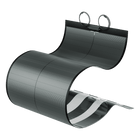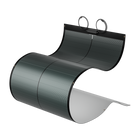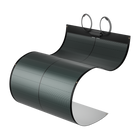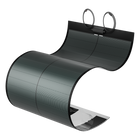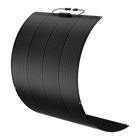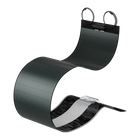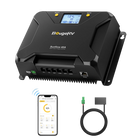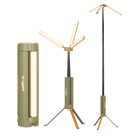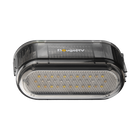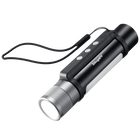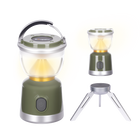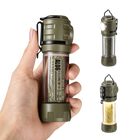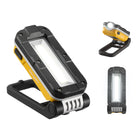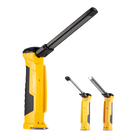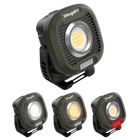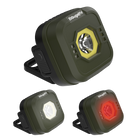Flexible Solar Panels VS. Rigid, Which Is Better?


As solar technology advances, you can find two prominent choices: flexible solar panels and rigid solar panels. Suppose you find yourself contemplating the installation of solar panels. In that case, you may wonder which option is better suited for your needs. This article will delve into the fundamental differences between flexible and rigid solar panels.
We will explore their unique characteristics, advantages, and limitations, giving you the knowledge, you need to make an informed decision. So, whether you are an eco-conscious homeowner, an outdoor enthusiast, or an entrepreneur seeking solar solutions, read on to discover the nuances that set flexible and rigid solar panels apart.
Flexible Solar Panels vs. Rigid Solar Panels, What's The Difference?
Flexible solar panels are available for bending without breaking and suffering severe damage. While traditional rigid panels are stiff to the touch. Flexible and rigid solar panels both offer unique advantages and disadvantages, making it crucial for consumers to understand the differences before choosing.
In this in-depth blog, let's explore the contrasting features of flexible and rigid solar panels, providing you with comprehensive insights to aid your decision-making process.
Advantages Of Flexible Solar Panels vs. Rigid

Versatility: Flexible solar panels are lightweight and, as the name suggests, flexible, allowing for easier integration into various surfaces. Unlike their rigid counterparts, these panels can conform to curved surfaces, making them ideal for unconventional applications such as solar-powered tents, backpacks, boats, and portable chargers. Their flexibility grants designers the freedom to incorporate solar power into innovative designs.
Enhanced Durability: Flexible solar panels are built with advanced materials that offer increased durability. They can resist harsh weather conditions, including high winds, hail, and extreme temperatures.
At BougeRV, our sturdy and waterproof CIGS solar panel tolerates any strikes that occur during transportation, installation, and working. Even if it’s partially broken, our CIGS solar panels still function. This resilience makes them an excellent choice for outdoor installations, ensuring reliable power generation even in challenging environments.
Disadvantages Of Flexible Solar Panels vs. Rigid
Lower Efficiency: Flexible solar panels typically have lower energy conversion efficiency than rigid panels. The flexible design often sacrifices some efficiency due to the lightweight and thin nature of the materials used. While still capable of generating usable electricity, they may require a larger surface area to produce the same power output as rigid panels.
However, you can still buy one flexible solar panel that creates stable power output at BougeRV as our flexible solar panels do better than conventional monocrystalline rigid panels in shaded conditions and cloudy days, producing 38% more power in an 8-hour cloudy day.
Costly: When you shop online, you will find that flexible solar panels cost more than rigid ones. Because of the advanced technology to produce flexible solar panels, the price of flexible solar panels might be beyond your budget.
Flexible Solar Panel Weight vs. Rigid

Regarding weight, flexible solar panels have a clear advantage over their rigid counterparts. The lightweight construction makes them more manageable during installation, especially when weight restrictions are a concern. This weight reduction also contributes to the ease of transportation, making flexible panels a popular choice for mobile applications like RVs, boat canopies, and off-grid adventures.
Made by CIGS technology, BougeRV flexible solar panels are as ultra-thin as light credit cards, and weigh less than 2KG every 100W.
How Long Do Flexible Solar Panels Last vs. Rigid?
Flexible solar panels generally have a lifespan comparable to rigid panels, despite their differences in design and construction. Both types typically come with warranties ranging from 10 to 25 years, ensuring years of reliable power generation.
Proper maintenance, regular cleaning, and avoiding excessive stress on the flexible panels will contribute to their longevity, allowing you to enjoy clean energy for many years to come.
Do Flexible Solar Panels Overheat?
All solar panels, regardless of type, absorb energy from the sun, and a portion of this energy is converted into heat. Effective heat dissipation is crucial to maintain optimal panel efficiency and prevent potential damage.
However, concerns have been raised about the potential for overheating in flexible panels, which could impact their performance and longevity. Let's examine whether flexible solar panels are prone to overheating by understanding their aspect of operation.
Factors Affecting Overheating:
- Temperature Coefficient: Solar panels have a temperature coefficient, which indicates how their electrical output is affected by temperature changes. This coefficient varies among different panel models.
Generally, the temperature coefficient of flexible solar panels is higher compared to rigid panels, meaning their electrical output decreases to a greater extent as the temperature rises. However, this does not necessarily imply that flexible panels will overheat more than rigid panels.
- Installation and Ventilation: How solar panels are installed, and the surrounding environment play crucial roles in their heat management. Proper installation ensures adequate airflow around the panels, allowing heat to dissipate efficiently. Inadequate ventilation or installations in areas with limited air circulation can increase heat buildup.
- Operating Conditions: Environmental factors, such as the ambient temperature, intensity of sunlight, and presence of shade, influence the operating conditions of solar panels.
Higher ambient temperatures can increase the likelihood of overheating, especially if the panels are exposed to direct sunlight without sufficient airflow. With BougeRV CIGS flexible with a temperature coefficient of -0.38%/°C, you can directly install it on the mounting surface.
Mounting Flexible Solar Panels vs. Rigid

While rigid panels are commonly mounted using traditional racks or brackets, flexible panels are easier to install and offer more flexibility in installation options. They can be adhered directly to surfaces, including roofs, RVs, or even tents, using adhesive backing or fasteners.
You can install some flexible solar panels in just minutes. This is also an excellent feature for you if you are concerned about drilling holes into your mounting surface, which could cause water and let in water.
Here are the steps for mounting a flexible solar panel
Finding the ideal place for your solar panels is the first step. It is advisable to select an area with abundant sunlight and minimal obstructions.
1. Clean the mounting surface: Once you have procured your solar panels and identified the perfect mounting spot. Ensure that the surface is clean, free from debris, and smooth.
2. Measure and mark the mounting points: Measure and mark the positions where the adhesive tape will be placed. Remove the protective backing and carefully apply the tape to the marked positions on the mounting surface. Press firmly to ensure a strong bond.
3. Attach the solar panel: Carefully position the solar panel onto the tape, aligning it with the marked positions. Press firmly to ensure a strong bond. Subsequently, establish a connection between the positive and negative wires of the panel and a charge controller as per the manufacturer's guidelines.
4. Connecting solar panels to battery: After successfully installing the solar panels, it is crucial to connect to a battery bank, which can also be a portable power station. This connection enables the solar panels to charge the batteries, facilitating the power supply for your electrical systems.
5. Comprehensive system testing: The final step involves rigorously testing your solar panel system. Verify that the panels generate power as expected and that the controller functions correctly. Activate your appliances and ascertain whether they receive an adequate power supply from the solar panels. A successful outcome confirms the successful installation of your solar panels.
This versatility in mounting options provides greater design freedom and opens up possibilities for unique solar installations. You can also check the installation guideline to choose which installation option will be easy for you.
Flexible vs. Rigid Solar Panels For RV

Flexible panels offer notable advantages for RV owners seeking to harness solar power. Their lightweight and thin design makes them easier to install on the curved surfaces of RV roofs.
Additionally, their flexibility allows for convenient storage and portability, enabling RV owners to quickly set up and dismantle the panels when moving between campsites. The durability of flexible panels ensures they can withstand the rigors of travel and harsh outdoor conditions.
The Greatest Application Of Flexible Solar Panels vs. Rigid
While both flexible and rigid solar panels have diverse applications, flexible panels excel in certain areas. Their unique design makes them highly suitable for portable and mobile power solutions. From solar-powered backpacks that charge electronic devices on-the-go to flexible panels integrated into architectural structures, these panels offer unparalleled versatility in terms of design and application.
Their ability to adapt to curved surfaces and unconventional settings makes them a top choice for innovative solar projects.Choose Flexible Solar Panels Or Rigid Ones? It Depends
Choose Flexible Solar Panels Or Rigid Ones? It Depends
The decision to choose between flexible solar panels or rigid ones can be a challenging one. Both options have unique advantages and considerations, making it essential to weigh the factors that align with your needs.
BougeRV Flexible Solar Panels

Suppose you require solar panels that can conform to curved surfaces, such as the roof of an RV, boat, or a uniquely shaped structure. In that case, BougeRV's Yuma CIGS flexible solar panels are an excellent choice. Their flexibility allows them to seamlessly integrate into curved surfaces, generating maximum solar power in unconventional settings.
Also, suppose you need solar panels for portable power solutions like camping, hiking, or backpacking. In that case, BougeRV's flexible panels are a great fit. Their lightweight design, thin profile, and flexibility make them easy to carry and set up, enabling you to harness solar energy on the go. These panels are also ideal for solar-powered tents, backpacks, and portable charging stations.
BougeRV Lightweight Rigid Solar Panels

Suppose you are looking for solar panels for traditional rooftop installations or ground-mounted systems. In that case, BougeRV's lightweight, rigid solar panels are a suitable choice. These panels are designed for easy integration into existing solar systems, ensuring seamless compatibility with standard mounting systems and structures.
Their solid construction, reinforced frames, and tempered glass fronts enhance protection against external elements, ensuring long-term performance. These panels are designed to withstand strong winds, heavy snow loads, and other challenging environmental conditions commonly encountered in fixed solar installations.
Conclusion
The choice between flexible and rigid solar panels relies on your specific requirements. While flexible panels offer versatility and lightweight design for curved surfaces and portable applications, rigid panels excel in traditional installations with higher energy conversion efficiency. Consider your needs and tastes to determine which option is better for you.
Want to get solar panels for your next trip? Take a look at quality types of 12V solar panels at BougeRV.com now!
FAQs
1. Are rigid or flexible solar panels better?
The choice between rigid and flexible solar panels depends on specific requirements and applications. Rigid panels generally offer higher energy conversion efficiency. They are more suitable for traditional installations where durability and maximum efficiency are desired.
Flexible panels, on the other hand, excel in applications that require conformability to curved surfaces, portability, and lightweight design. Ultimately, the "better" option will depend on factors such as installation type, design flexibility, and specific project needs.
2. What are the disadvantages of flexible solar cells?
Some common drawbacks include lower energy conversion efficiency compared to rigid panels, requiring a larger surface area to generate the same power output. They are also more delicate and require careful handling during installation and transportation to avoid damage.
3. Why are flexible solar panels less efficient?
The lightweight and thin construction of flexible panels often necessitates using less efficient materials and manufacturing processes. The flexibility of the panels requires sacrificing some efficiency, as the thin layers and lighter components may not capture and convert sunlight as effectively as rigid panels.
However, it is important to note that the efficiency gap between flexible and rigid panels has narrowed in recent years due to advancements in flexible solar cell technology.
4. Can I walk on a flexible solar panel?
Walking on flexible solar panels is generally not recommended. These panels are more delicate and can be easily damaged or punctured when subjected to excessive weight or pressure. But, you can walk on the BougeRV Yuma CIGS flexible solar panels.
5. Can flexible solar panels get wet?
Flexible solar panels are designed to withstand exposure to various weather conditions, including rain and moisture. They are typically constructed using materials that provide adequate protection against water ingress and have sufficient waterproofing measures.
















